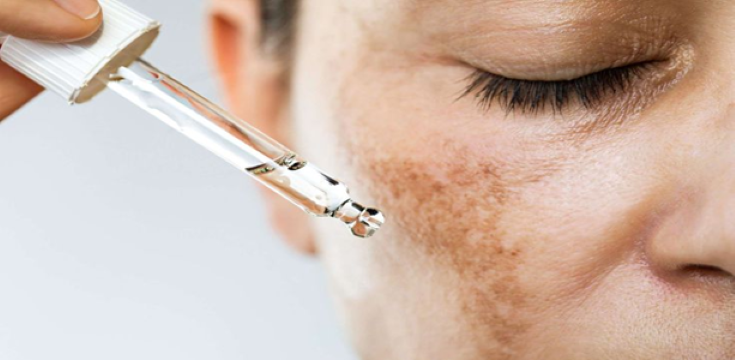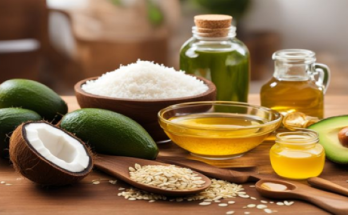If dark skin spots due to hyperpigmentation bother you, one thing is clear: Today, more options are available for erasing that harmless but irksome discoloration than ever before. Hyperpigmentation refers to any patch of skin that looks darker than your natural skin tone because the skin is producing too much of the brown pigment melanin. Causes range from sun exposure to inflammation to melasma to certain medical conditions or even medications. Liver spots (or age spots) and sunspots are examples of hyperpigmentation.
Keep Skin Moist to Boost Cell Turnover
While your primary goal with lessening hyperpigmentation is to lighten the dark spots, an effective over-the-counter (OTC) moisturizer should contain ingredients that benefit the skin in other ways. A good moisturizer can also restore the skin’s lipid, or fat, barrier, helping new skin cells stay healthy as they rise to the surface in place of old ones.
Protect Your Skin From the Sun
The most effective way to prevent sun-induced discoloration is to diligently apply a broad-spectrum sunscreen with a sun protection factor (SPF) of 30 or greater every day, even on cloudy or cool days. UV rays just send the pigment into overdrive, turning dark spots darker, so wear sunblock daily on exposed areas. Additionally, the AAD recommends avoiding the outdoors between 10 a.m. and 2 p.m., when the sun is strongest. You can also wear a wide-brimmed hat to protect your head, face, ears, and neck.
Keep Your Hands Off Bug Bites, Blackheads, and Other Injuries
As tempting as it may be to scratch a mosquito bite or squeeze a stubborn blackhead, remember your mother’s warning — “Don’t pick!” — and follow that advice. Scratching and picking at a spot will only increase the inflammation that’s responsible for skin discoloration, and the more you mess with it now, the worse it’ll look later.
Explore OTC Whitening Options
The sooner you treat hyperpigmentation, the easier it will be to erase. The pigment in brown spots can move deeper into the skin over time. Spot-eradicating ingredients to look for in OTC treatments include azelaic and glycolic acids, vitamin C, and retinoids.
Treatments containing ingredients like vitamin C, licorice root, and kojic acid help reduce hyperpigmentation by inhibiting tyrosinase, an enzyme responsible for the formation of skin-darkening melanin.
Also, products with tranexamic acid and beta and alpha hydroxy acids may be beneficial. Alpha and beta hydroxy acids work by exfoliating the surface layer of the skin, promoting cell turnover, and removing pigmented cells. While many of these OTC ingredients have “bleaching” effects on dark spots, the AAD strongly cautions against applying liquid bleach to your skin.
Consider an Rx for Stubborn Skin Discoloration
If OTC remedies aren’t helping, it’s time to call in the pros. Dermatologists consider products with hydroquinone, alone or combined with other lighteners, to be the gold standard for fading dark spots because they slow the production of pigment. Have your dermatologist closely monitor hydroquinone treatment, and in high concentrations, hydroquinone can cause sun sensitivity and may bleach the skin.
Ask a Dermatologist about High-Tech Options
If topical solutions aren’t fixing the problem, you may want to talk to your dermatologist about more aggressive ways to banish discoloration, such as chemical peels, microneedling, microdermabrasion, or dermabrasion, or a laser resurfacing procedure.
For those with very sensitive skin, broadband light therapy (BBL), which uses high-intensity light that’s gentler than a laser, may be a suitable alternative. Skin specialists who treat hyperpigmentation carefully assess patients’ skin before recommending procedures.
Try Aloe Vera
Social media is rife with recommendations for at-home skin-lightening solutions, most of which overpromise and underdeliver. However, some research suggests one popular remedy may be worth it. Aloe vera and the active chemical aloesin are known for their soothing, anti-inflammatory effects, which is why it is commonly recommended over the counter to help with skin irritation and sunburns.
In higher concentrations, it may help with skin lightening by inhibiting tyrosinase and melanogenesis, both pathways to forming pigment in the skin, according to research. Although some sites suggest using lemon juice for lightening skin, Massick warns against this. “Psoralen, found in the juice from limes and lemons, can actually cause hyperpigmentation if the juice applied to your skin gets exposed to the sun.
Eat a Balanced Diet
Skin health starts from the inside out, so a nutritious diet is essential. Nutrient-dense foods contribute to healthy skin, just as processed foods lead to a nonvibrant, dull, or unhealthy skin appearance. Foods rich in vitamins A, B, C, and E, antioxidants, and minerals such as zinc, calcium, and magnesium are particularly beneficial for skin repair and cell renewal.
Supplements containing extracts from green tea, licorice, or mulberry may also help with skin brightening and inflammation. Additionally, some evidence suggests supplements containing Polypodium leucotomos, an extract derived from a fern native to Central and South America, may help protect the skin from sun damage.
While there are no foods that cause hyperpigmentation, some may intensify it. Foods with a high glycemic index, such as candy, sugary drinks, and white bread, tend to rapidly raise blood sugar levels, stimulating melanocytes, the cells that produce melanin. Also, excessive alcohol can dehydrate the skin and dilate blood vessels. This leads to a more flushed appearance that can make hyperpigmentation look more pronounced.
Hyperpigmentation is a common condition, but if you’re self-conscious about your skin, plenty of solutions are available. Although dark spots are usually harmless, see a doctor, such as a dermatologist, if your skin is red, itchy, painful, or hot to the touch, or if you notice pus leaking.




